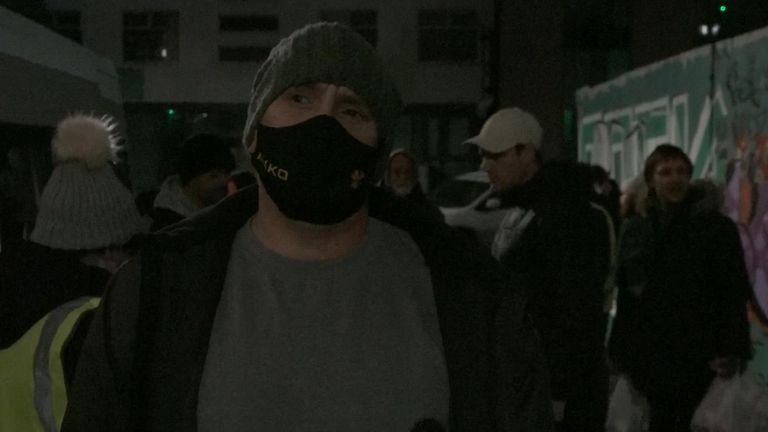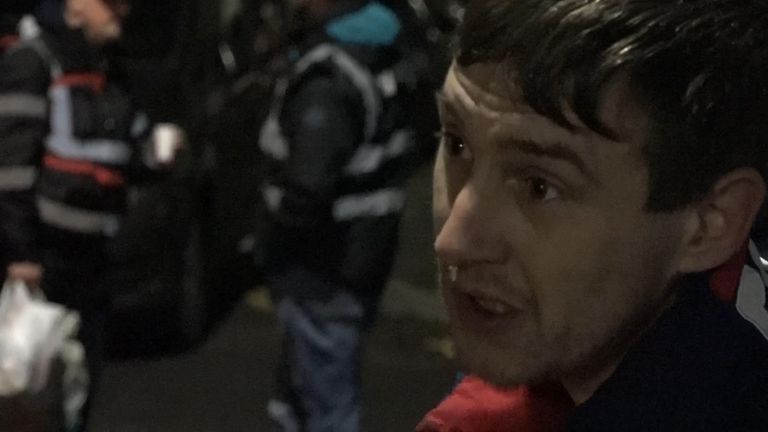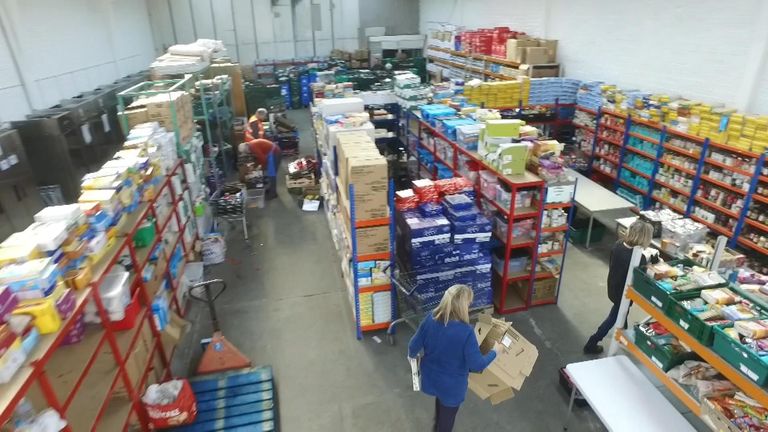It’s 9pm, in a dark and drizzly Plymouth city centre as the soup van pulls into a dead-end road surrounded by tall office blocks.
Twenty hungry people are already waiting in a queue.
Volunteers tell me some of them will have walked a couple of miles to get there – and this will be the first hot meal of their day.
The first person we chat to is David, a family man who is having to use the soup van for the first time.
“I live with a partner and five-year-old child at the moment so these facilities are a lifesaver – it’s all we’ve got really, you know,” he said.
David tells me he is a trained carpenter, but lost all his work due to COVID-19.
“I’ve never really used these facilities over Christmas – this will be my first Christmas using them so I can imagine it’s a life saver for a lot of people. It’s going to be a life saver for me this year definitely.
“I’m a Yorkshire lad. I’ve got no airs and graces. I’m not different to anyone else, I’ve just been very lucky in my life that I’ve not been in this position yet but I am now and this is the way it is – it’s the way this year has turned out to be.”
The soup van makes four stops a night, seven days a week and although most who visit are long-term homeless, there has been an increase in people who need help because they’ve lost their livelihoods this year.
Hilary Knight runs the Plymouth Soup Run.
She believes Christmas Day this year will be very different.
“Traditionally and historically we would expect our numbers on Christmas Day to be lower because we’re out in the evening and most people would have been able to access a really lovely Christmas meal – a communal Christmas meal – and this is of course the problem this year,” she said.
“Our understanding is there won’t be big communal indoor meals like in the past so we’re planning to take out a different meal in the evening – we will cater for more than we normally would.”
As well as hot soup, the van hands out a carrier bag of donations – from bread to noodles, fresh fruit to even KFC – that had been donated by a branch that night.
The organisation is on track to serve 28,000 meals this year. It’s a record number.
On the third stop we meet Nathan.
He was homeless throughout both national lockdowns, but has now secured a room in a hostel thanks to help from the volunteers.
“The first lockdown was a nightmare,” he said. “I had to beg on the streets.
“When I was proper sleeping rough I was coming nightly [to the soup kitchen] then – and if I didn’t have that I wouldn’t have had nothing. It is a bit of a life saver to be honest.”
The next day we cross the Tamar Bridge from Devon into Cornwall – a county which suffers with some of the worst rates of food poverty in the UK.
We meet Don Gardner in a large industrial warehouse where shelves inside are stacked 10 metres high with every type of food you could imagine.
Before COVID-19 the Camborne, Pool and Redruth Foodbank was providing 8,000 meals a month.
During the outbreak that went up to 26,000.
Don said the virus changed everything. “I lost 95% of my volunteers because they’re over 70, including me. I had to work from home.
“I also lost 99% of my food income, I couldn’t get the food out of churches, that died immediately – no supermarket, because of panic buying we couldn’t buy stock and our need was going higher and higher.”
He said the demand was driven by a surge in those being furloughed.
“The client base has changed dramatically to be honest – people going on furlough, they were on minimum wage, 80% of their wages, and they couldn’t survive,” he said. “There were lots of tears – not just from them, from me, hearing the stories.”
To hear some of those stories, that afternoon we joined Don and his volunteers at the food bank in the town of Camborne – one of the most deprived parts of the UK.
We meet Kathryn Barlett. She’s struggled to find work this year and although she now has a job, she says it’s not enough.
Kathryn said if it wasn’t for the foodbank, she’d have to choose between heating and eating.
“Quite often cereal and toast are your friend. No disrespect but you hear magazine programmes about ‘let’s try not having meat one evening’, and you think, one evening? I’d be lucky to have a proper meat dish once a week, if I do.”
Mum of four Lola King is also in the queue to collect food for her family, including chocolate advent calendars for her children.
She said: “It makes you feel happy – tearful – because what they’re doing for everyone, they don’t just do it for me they do it for everyone. It’s a really nice gesture that someone in this community is doing something like that.”
In the back room, a young lady is busy organising hundreds of boxes of wrapped presents.
Shamela Smith was helped by the food bank in 2019, and wanted to give something back.
This year, around 300 Christmas boxes will be given to the most vulnerable – children who otherwise may not receive a present this Christmas.
“There’s 80 children that’s going to get an extra gift at Christmas,” she said. “It makes me feel overwhelmed as well as knowing those children are going to get an extra gift. A little bit more excitement at Christmas.”




